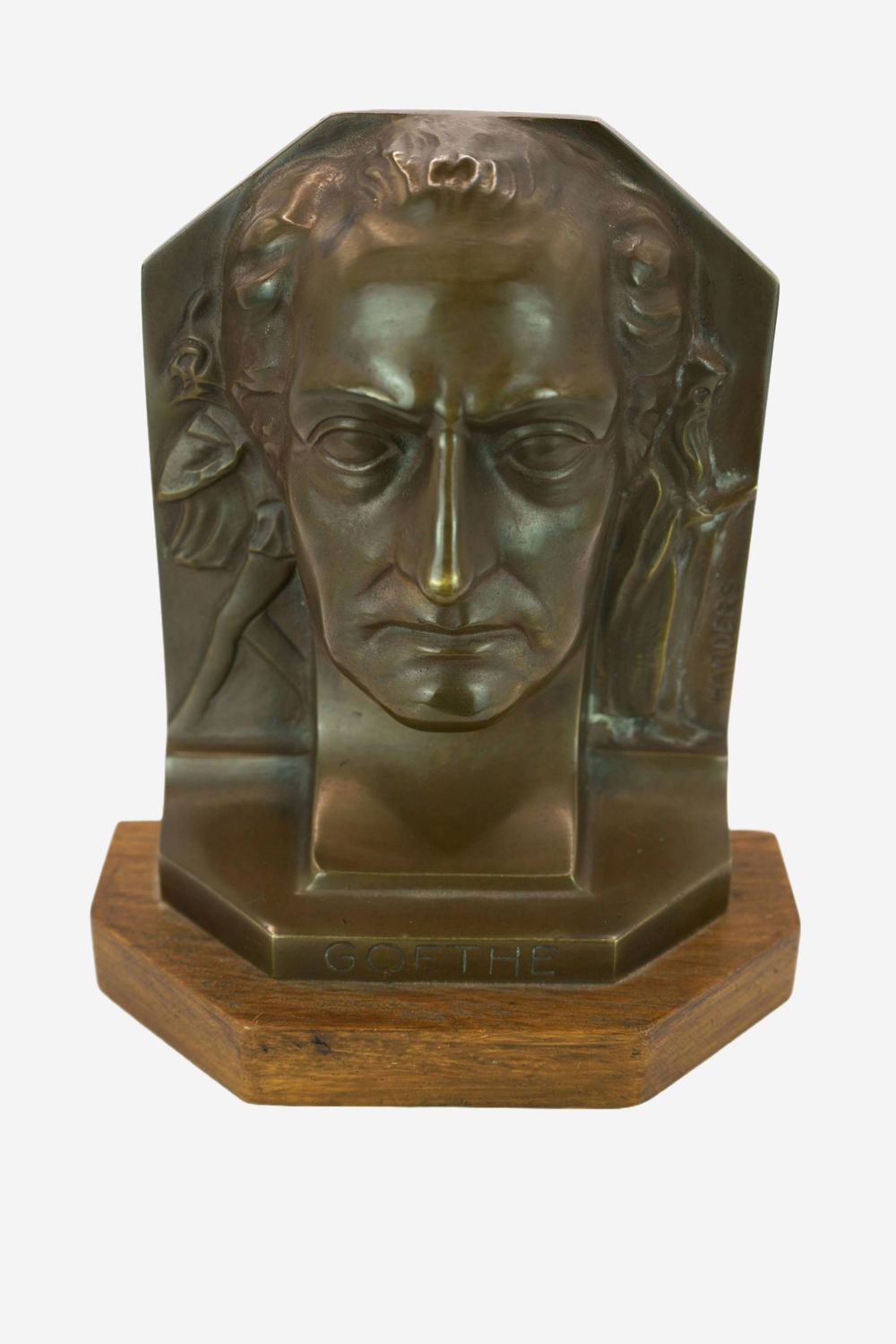Harders, Hans (1875-1955), Goethe (bookend), c. 1935
Hans Harders(1875 Mörel - 1955 Berlin), Goethe (bookend). Patinated brass mounted on a wooden base, 15 x 12 x 6 cm (depiction), 17 x 14.5 x 7 cm (with base), signed in the cast "HARDERS", um 1935.
- Nose tip somewhat rubbed, otherwise in very good condition
- Goethe's Will -
Hans Harder's Goethe joins the still largely unwritten art history of the bookend. With the emergence of bourgeois libraries, this new genre of art developed in the 19th century. The bookend fulfills its potential as a work of art when it refers to the book, not only in formal terms, but also as a manifestation of the spiritual. In this sense, Hans Harder's Goethe is a major work of the then young but flourishing art genre.
We see a portrait bust of Goethe in which the extremely strikingly carved features lend the face of the poet-prince something monumental. The powerful nose juts forward in a straight line, the chin also protrudes, the lips are slightly pressed together, the eyes are widened in a visionary manner, while the wrinkles on the high forehead testify to somber thoughts as well as the unwavering will to confront himself with the destiny he sees before him.
On the background panel that forms the surface of the bookend, Mephistopheles is depicted in semi-relief on the left and Faust on the right, as if they had stepped out of Goethe's head. There is something mischievous about Mephistopheles, who moves through the world with an elegant, seductive stride reminiscent of a Morris dancer. Faust, on the other hand, is portrayed as a prophet who has left the knowledge of the world behind him and, like Gothe, begins to see through words. A reflection on the inadequacy of book knowledge, as Faust formulates it in his famous monologue:
I've studied now Philosophy
And Jurisprudence, Medicine,--
And even, alas! Theology,--
From end to end, with labor keen;
And here, poor fool! with all my lore
I stand, no wiser than before.
Mere reading, as the monologue can be applied to the library represented by the bookend, leads only to a great deal of knowledge, but to nothing of substance. Accordingly, Friedrich Nietzsche, in the essay Vom Nutzen und Nachteil der Historie für das Leben (1874), which is part of his Unzeitgemäße Betrachtungen (1874), distinguishes between a monumental, an antiquarian, and a critical type of history. The antiquarian view having a merely affirmative character, which regards the past, or rather the accumulated written material, as a value in itself. While the antiquarian perspective also has its justification in Unzeitgemäße Betrachtungen, in Fröhliche Wissenschaft (1887), the monumental-heroic is the only world view that allows man to transcend himself. "What is heroic?" - At the same time," says Nietzsche, "to go towards one's highest suffering and one's highest hope.
It is precisely in this late Nietzschean intensification that Harders has shaped the expressive content of Goethe's face. Goethe becomes the quintessential "Faustian" who, through heroic determination, overcomes his inner turmoil and thus penetrates to the true meaning of life, which cannot be revealed through much reading. The quest for a new transcendence unites Harder's work with the creations of Fidus. And the power to overcome oneself is also nourished by the power of the written word, which is kept in the library. The books that really matter are heroic creations, born of this very struggle, as Goethe himself created them.
About the artist
Hans Harder's artistic talent was already evident as a child, when he made animal figures out of clay. His parents, farmers from Mörel, encouraged their son's talent and enabled him to study at the art academies in Berlin and Dresden. Following his artistic roots as a sculptor, he became a sculptor and medalist. Based in Berlin, his bronze works were produced by the Rosenthal & Maeder foundry and later by Preiss & Kassler. From the 1920s he also created models for the porcelain manufacturers Fraureuth and Hutschenreuther.

